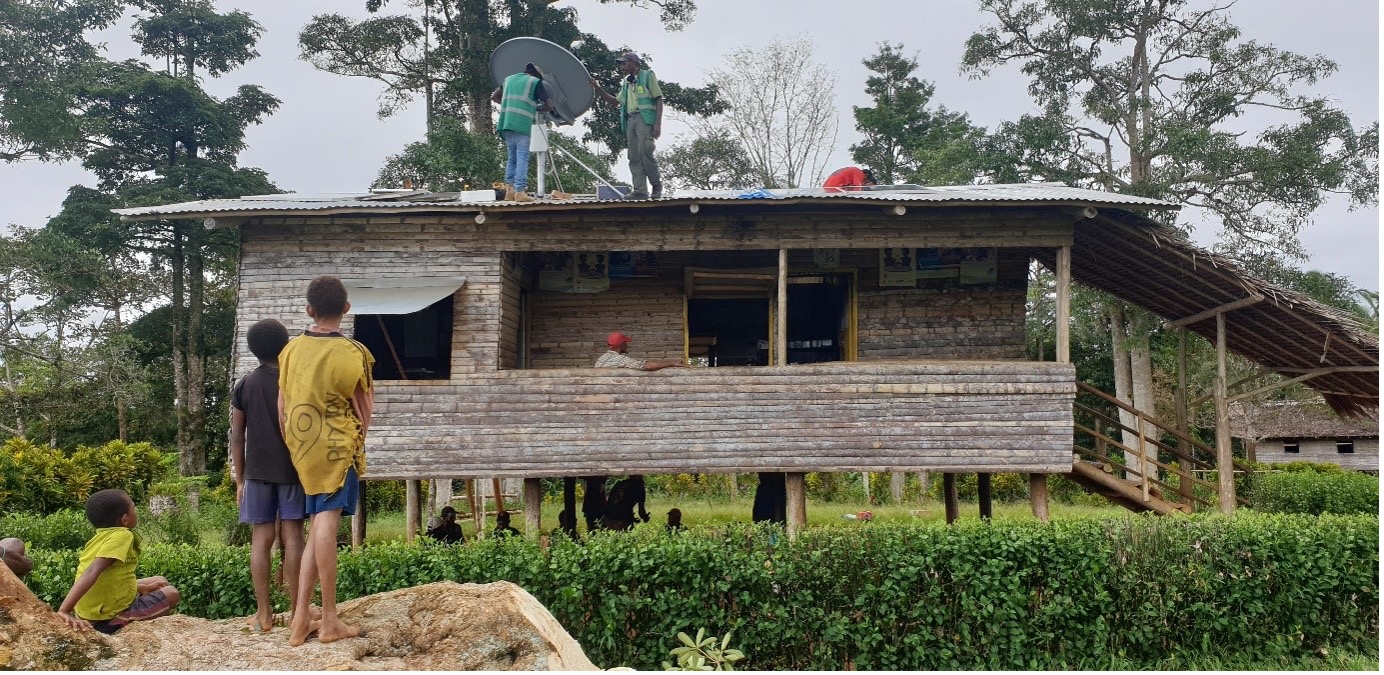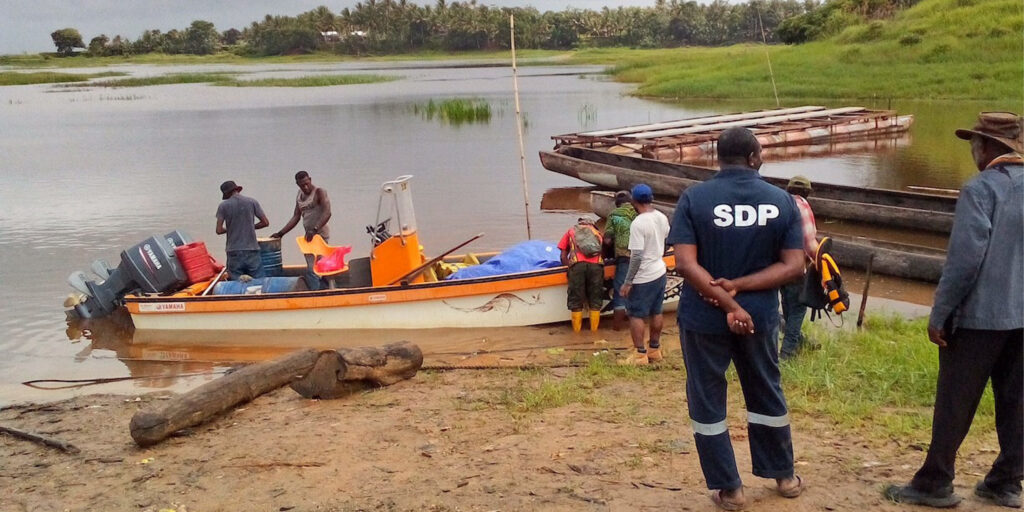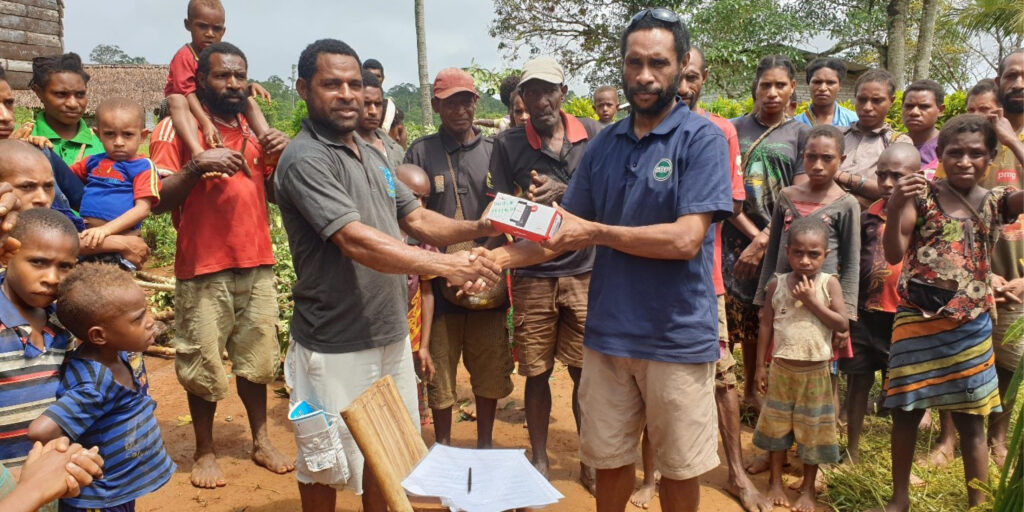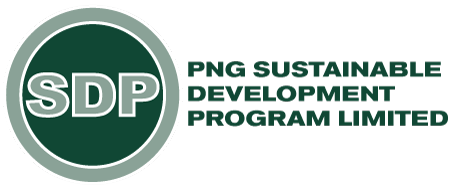Satellite dishes open communication lines for rural health facilities in PNG’s Western Province

The satellite booster being installed at the Hesalibi Aid post, opening lines for them.
The PNG Sustainable Development Program Limited (SDP) is working with Kacific Broadband Satellites Group (Kacific), Emstret Holdings and Tag Energy to install and operate 30 satellite dishes powered by a solar system (1kW solar kits & LED light fittings). These satellite dishes have started to connect 30 remote health facilities in Papua New Guinea’s Western Province to the outside world via a satellite internet service.
Twenty installations have been completed in places that previously never had any regular method of communication with the outside world. The five-person installation team continues to push into some of the most difficult terrains in the country, deftly managing security challenges and tough conditions, often by small dinghies in crocodile-infested waters.

The installation team getting ready to visit another community to install the satellite dish.
SDP works across Western Province delivering development initiatives for the benefit of the people. Its programs are focussed in the areas of health, education, creating jobs and enabling infrastructure. These initiatives are closely aligned with the Western Province 5-Year Development Plan (for more information, visit www.pngsdp.org).
Several years ago, SDP invested in upgrading the telecommunications network to a 4G service but some coverage gaps remain. This “proof of concept” initiative will test a new, state-of-the- art technology to address these problems.
Kacific Broadband Satellites Group (Kacific) is a next-generation broadband satellite operator that provides affordable, high-speed broadband access to Asia Pacific. Its new Kacific1 geostationary satellite uses the latest multi-beam space communications and ground technology to provide high-quality service to businesses, governments and communities.
Kacific’s high-throughput Ka-band satellite delivers internet connectivity throughout the Pacific and South East Asia (especially to underserved rural and suburban areas). These services foster greater internet usage, which in turn fuel economic growth and greatly improved populations safety and welfare (for more information, visit www.kacific.com.
The recently installed satellite dishes enable the Community Health Workers to access the internet via mobile phones to seek specialist medical advice from an on-call doctor based at Rumginae Hospital or organise life-saving medical evacuations on a Mission Aviation Fellowship (MAF) flight. The new technology will also enable SDP’s Aerial Health Patrol medical teams to provide better support for these health facilities by receiving calls for medical advice and requests to assist with medical supplies at any time of the day and night.
Michael Maimana is one of these Community Health Workers based in Hesalibi. He explains what this satellite dish is doing for his community.

From left: Hesalibi CHW, Michael Maimana receiving the mobile phone from SDP’s Richard Onde.
“I have worked under Rumginae Hospital under the ECPNG Church since last year. I struggle all the time to communicate with my supervisor through the VH radio. I am grateful for the satellite booster team that came all the way to our community to set up the communication system for our health facility. This was least expected by the community. My prayers are answered. I don’t have to go to Mougulu to make a phone call, I can call Rumginae Hospital from Hesalibi using the satellite booster phone via WhatsApp. I thank PNGSDP for the great initiative to improve the health outcome of this province by linking the remotest communities to the other health facilities especially in the process of medical emergencies and referral pathways,” said Michael.
To get to Mougulu from Hesalibi to make a call to Rumginae would usually take Michael three days and two nights on foot. But now, he doesn’t have to do that anymore. He can call directly from Hesalibi.
This connectivity link also enables training opportunities and the subsequent upskilling of health workers and easy access to regular training sessions and webinars, on topics such as COVID-19 awareness training (provided by SDP’s Aerial Health Patrol team). Additionally, health workers and the community members can now provide vital weather and airstrip information to MAF, so that the Aerial Health Patrol teams can travel there safely and provide much-needed primary healthcare.
In response to the Covid-19 pandemic, Kacific collaborated with donors to provide satellite dishes free of charge and short-term free internet service for health initiatives in Asia Pacific nations. SDP provided the solar power solutions and the logistics support for the installation efforts.
“Our satellite internet service is designed to provide an affordable and accessible service to people in very remote areas,” says Christian Patouraux, CEO and founder, Kacific. “Papua New Guinea has a very challenging geography for traditional infrastructure, such as tall cell phone towers. In many cases, we needed to use SDP’s small aircraft to reach the communities. Despite the geographical challenge and the pandemic restrictions, we were able to roll out this service with our partners very quickly. This service will make a rapid and lasting impact on the communities that are now connected.”
